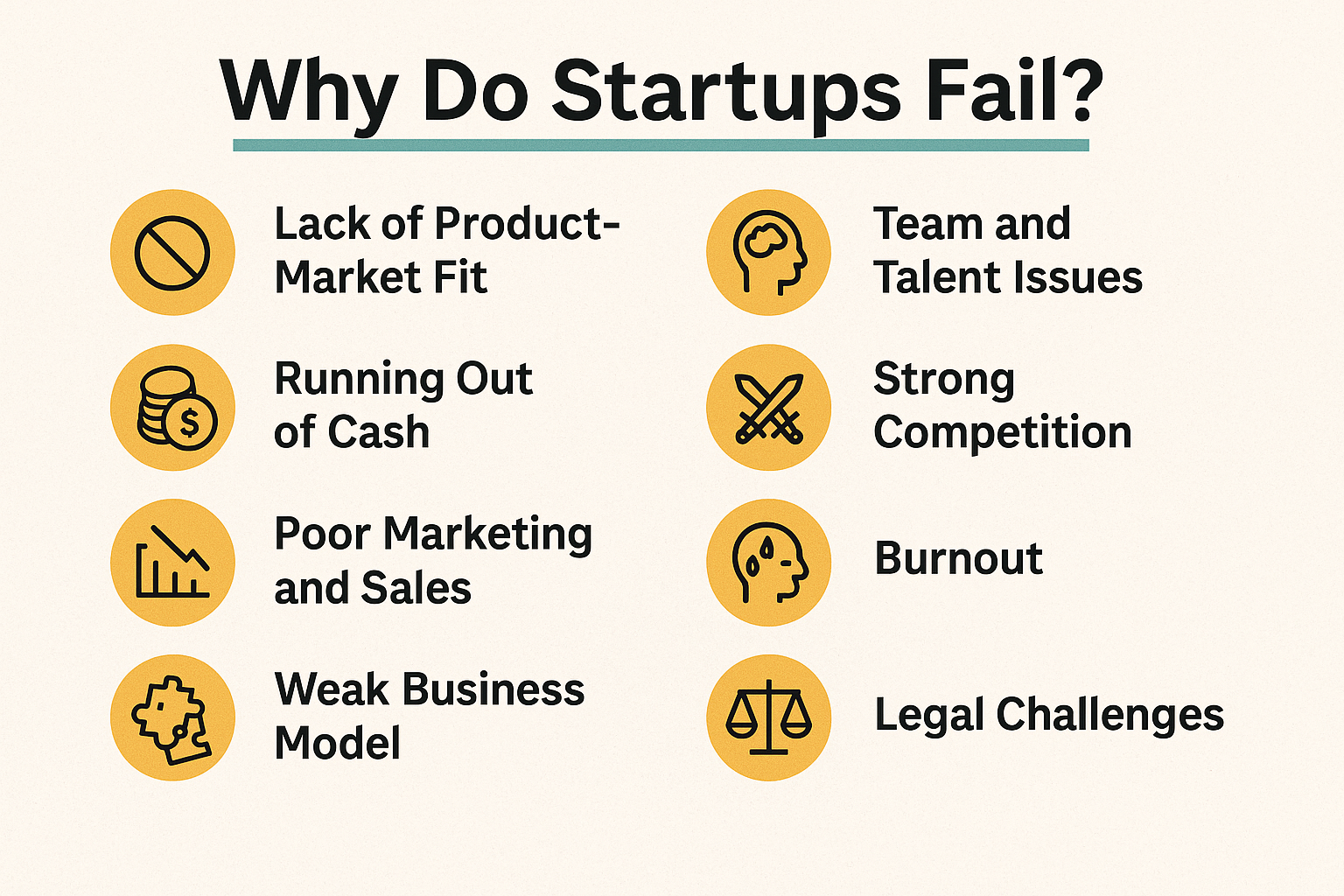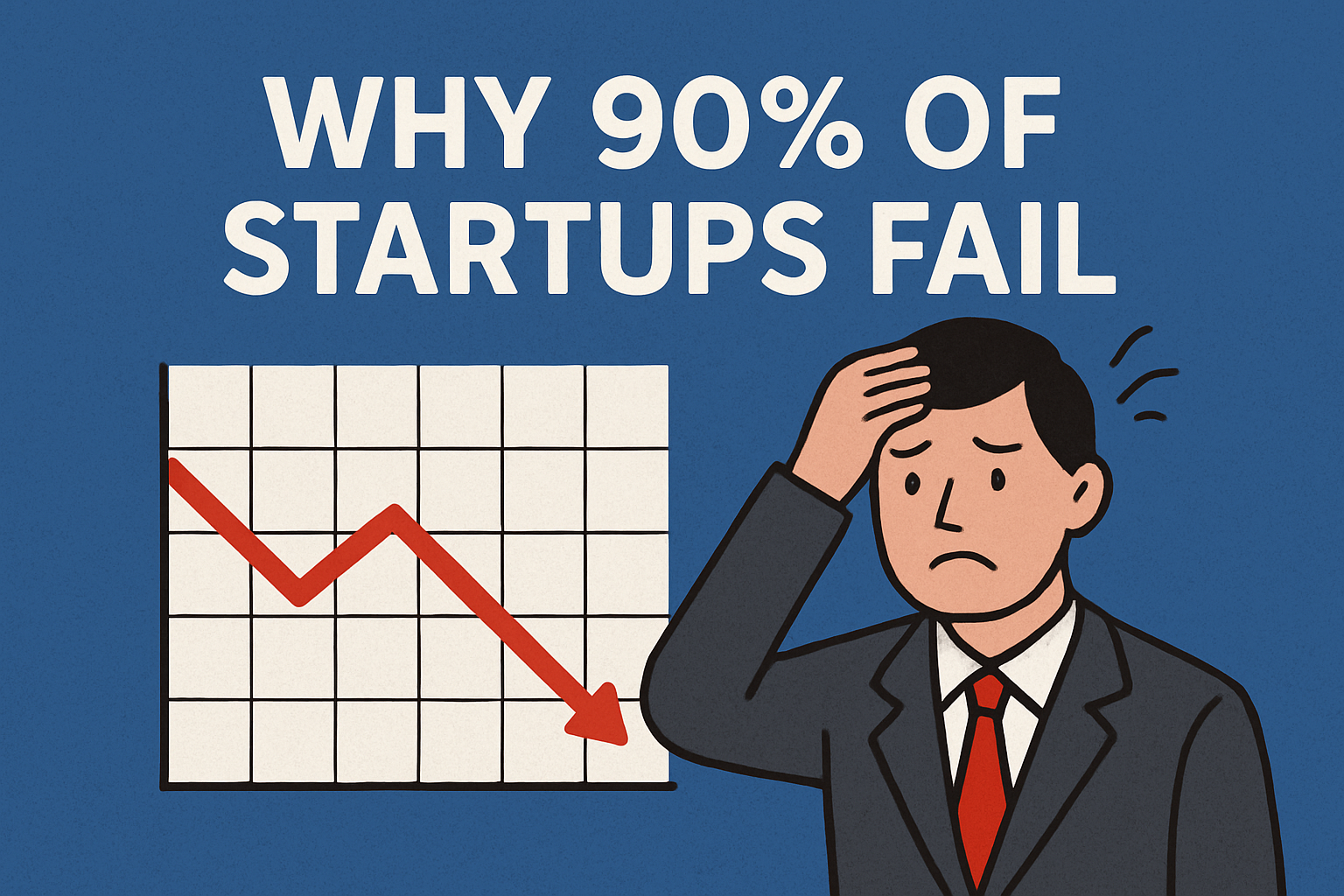🧠 Introduction: The Grim Statistic That Haunts Founders
Startups are sexy. Failure isn't.
But behind every viral product launch, angel investment, and hoodie-wearing visionary, there's a harsher reality lurking in the shadows: 90% of startups fail (Forbes, 2015).
That's not a typo. That's the truth.
This isn't just a statistic. It's a gut-punch to every dreamer who's mortgaged their time, money, and mental health in pursuit of building something great. It's the silent anxiety at pitch nights, the unspoken fear behind every "we're still in beta," and the heavy pause in a founder's voice when revenue's not where it should be.
But here's the twist:
Startup failure isn't random.
It's not just bad timing, bad luck, or being "too early to market." Most of the time, it's preventable.
In this blog, we're going beyond clichés and motivational fluff. We'll break down the real reasons startups crash and burn—based on data, analysis, and painful truths. From product-market misfires to burnout, brutal competition to cash burn, we're dissecting the anatomy of startup death.
Because the best way to beat the odds? Is to finally understand them.
🧨 The Core Reasons Behind Startup Failure

Behind every shuttered startup is a post-mortem of hard lessons. While failure can feel like an abstract bogeyman, the truth is far more tangible. Here's a no-fluff breakdown of the most common culprits—backed by data, dripping with reality.
1. 🚫 Lack of Product-Market Fit
This is the startup equivalent of trying to sell umbrellas in a drought. No matter how well-designed or innovative your product is, if there's no real demand for it, the venture is already on borrowed time.
📊 The Data: Around 34% of startups fail because they build something nobody wants (Exploding Topics, 2025; BSL Lausanne, 2024).
🧠 Translation: Founders fall in love with ideas instead of problems. The market doesn't care about your product; it only cares about what it solves.
💡 Looking for real, validated problems to solve? Our startup uses AI to mine social media and uncover real user frustrations—so you can build solutions that actually match the market. Learn how it works →
2. 💸 Running Out of Cash
Cash isn't just king. It's oxygen. The moment you run out, the game's over. Startups often overestimate revenue, underestimate expenses, or miscalculate how long it'll take to become profitable.
📊 The Data: Around 16% of startups collapse because the money dried up (Exploding Topics, 2025; LinkedIn).
💡 Pro Tip: Your runway isn't the total money in the bank. It's how many months you can survive at your current burn rate.
3. 📉 Poor Marketing and Sales
You built it. But no one came.
Even the most brilliant product won't magically attract users. Visibility, positioning, and persuasion are everything—and startups that neglect marketing are setting themselves up for a silent death.
📊 The Data: About 14% of startups fail because they couldn't get traction (LinkedIn).
🚫 The Myth: "If the product is good enough, it'll sell itself." Reality check: even Apple has a marketing budget.
4. 🧩 Weak or Vague Business Models
A product is not a business. A pitch deck is not a monetization plan. Many startups hit the market with excitement, only to realize they have no clear path to profitability—or worse, no clue how to sustain revenue at scale.
📊 The Data: 17% of startups fail due to flawed business models (LinkedIn).
🔍 Reality: If you can't explain in one sentence how your startup makes money, it probably won't.
5. 🧠 Team and Talent Troubles
A startup is only as strong as its people. Founder disputes, toxic culture, hiring misfires, and leadership gaps can poison the well quickly. Startups are pressure cookers, and if the team isn't resilient, everything implodes.
📊 The Data: 18% of failures stem from team-related issues (Exploding Topics, 2025).
⚔️ What to Watch: Ego clashes, unclear roles, or bringing on friends instead of qualified talent. It all adds up.
6. ⚔️ Brutal Competition
It's not just about being good. It's about being better than what already exists. Startups often underestimate how hard it is to gain market share when giants are already in play.
💥 The Challenge: In hypercompetitive arenas (like fintech or blockchain), standing out takes more than features. It takes speed, storytelling, and sometimes sheer survival grit (Coreteka, 2024).
📉 Outcome: The product might be solid, but if a competitor moves faster, burns more capital, or simply has better branding, you're toast.
7. 🥵 Burnout and Founder Fatigue
Startups are marathons run at sprint pace. The pressure to constantly deliver, pivot, raise, hire, and grow can break even the most passionate founders.
🧠 Psychological Toll: Burnout isn't just tiredness. It's chronic stress turned into apathy. And when the founder checks out, the startup usually follows (Coreteka, 2024).
🔥 Note: You can't scale a company if you're falling apart at the seams.
8. ⚖️ Legal and Operational Landmines
Sometimes, the devil's in the details. Compliance gaps, IP issues, tax missteps, or inefficient processes can quietly drain time, money, and morale.
📊 The Data: 2% of startup failures stem from legal headaches (Exploding Topics, 2025).
📌 Pro Insight: You don't need to love the legal stuff. You just need to respect it and hire someone who does.
📊 The Industry Lens – Where Failure Hits Hardest
Not all startups are created equal—and neither are their odds of survival. Some industries are inherently more volatile, saturated, or capital-intensive, turning them into startup graveyards. Below is a breakdown of the failure rates by sector, so you can see exactly where the risks run deepest.
| Industry | Failure Rate |
|---|---|
| Blockchain / Crypto | 95% |
| E-commerce | 80% |
| HealthTech | 80% |
| Fintech | 75% |
| EduTech | 60% |
| Construction / Retail | 53% |
| Manufacturing | 51% |
| Gaming | 50% |
🕵️ What the Table Tells Us:
- Blockchain and Crypto lead the pack in failure—not surprising given the speculative hype cycles and unclear regulatory landscape.
- E-commerce and HealthTech may seem hot, but fierce competition, thin margins, and complex logistics make these sectors unforgiving.
- Fintech demands both deep capital and tight compliance—two things startups often struggle to balance.
- Even traditionally "safe" sectors like Retail and Manufacturing are fraught with outdated systems and high overhead costs.
💥 Bottom Line:
Innovative doesn't always mean survivable. Some industries are trendier than they are sustainable—and knowing which battles to pick could be the first step in staying alive.
🗂️ At a Glance – The Summary Table
For the founder who needs the TL;DR before the next pitch meeting—here's your cheat sheet. These are the most common reasons startups go belly-up, along with the data that backs it up.
| Reason | % of Failures |
|---|---|
| Lack of Product-Market Fit | 34–42% |
| Cash Flow/Financial Issues | 16–34% |
| Poor Marketing/Sales | 14–22% |
| Team/HR Problems | 18% |
| Weak Business Model | 17% |
| Competition | Not quantified |
| Burnout | Not quantified |
| Legal/Operational Issues | 2% |
💡 Takeaway:
Most startups don't fail because of a single catastrophic mistake. They die from a slow bleed of multiple avoidable issues.
If you can dodge these, you're not average. You're ahead.
🧭 What Founders Can Learn
Failure might be common, but it isn't compulsory. The smartest founders treat every misstep—especially someone else's—as a masterclass in what not to do. Below are high-impact lessons distilled from thousands of startup autopsies.
⚙️ Validate Before You Build
Don't guess—test. Use landing pages, waitlists, and interviews to confirm there's a real problem and a willing market before writing a single line of code.
"Startups fail when they build a product for themselves instead of solving a problem for others." – Y Combinator Founder Advice
🧠 Hire Slowly, Fire Decisively
Your team is your engine. Build around competence and culture. Avoid hiring friends unless they're qualified, and don't let one toxic player tank the momentum.
💰 Manage Your Burn
Track your burn rate like your life depends on it, because it does. Plan for worst-case revenue scenarios. Always know how many months you have left.
🧘♀️ Protect Your Mental Bandwidth
You are not your startup. Prioritize sleep, clarity, and healthy boundaries. Founders who burn out don't pivot; they vanish.
🚀 Conclusion: Don't Be the 90%
Let's get real: Survival isn't random. It's intentional.
The founders who make it aren't just lucky. They're relentlessly curious, brutally honest about their weaknesses, and obsessive about execution. They study failure like it's a blueprint, because in a way, it is.
If you're building a startup right now, consider this your mirror. What's reflected back might sting, but it could also save you.
